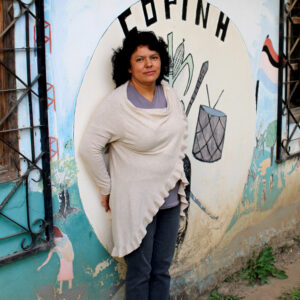In this moment of corporate power run amok, with each new headline demanding a response, and with so much at stake, it’s important to remember that there is a long history of people challenging corporate power — and winning.
In honor of Women’s History Month, we will be writing a series of articles on a few of the activists we admire, are inspired by, and on whose shoulders we stand.
Berta Cáceres was an Indigenous leader, a human rights defender, and an environmental activist who led a grassroots campaign to stop the construction of a hydroelectric dam that would threaten the Lenca peoples’ way of life and their access to important needs such as water, food, and medicine.
Born to the Lenca people in Honduras, Cáceres grew up during a time of violence and civil unrest in Central America. Her journey in activism began in 1993, when she co-founded the Council of Popular and Indigenous Organizations of Honduras (COPINH) to support the right of Indigenous peoples in the country. She fearlessly challenged illegal loggers, plantation owners, and multinational corporations carrying out mega-projects that often encroached upon Indigenous lands and destroyed Indigenous livelihoods.
One such project was the Agua Zarca Dam, a joint venture between several corporations and the International Finance Corporation, the private sector arm of the World Bank. Noticing an influx of machinery and construction equipment in their town, the Lenca people initially approached COPINH in 2006 to investigate the project. What Cáceres learnt during the course of her investigation sparked a years-long struggle against the project by COPINH , under Cáceres’ leadership and with full support and involvement from the Lenca community.
The strong protests and fierce opposition against the Agua Zarca Dam was met with violent repression not only from the developers of the project, but also from armed private security police and military personnel. Cáceres herself received countless threats of rape, murder, and physical harm for her role in leading this campaign. Yet, despite all odds, COPINH and the Lenca community’s efforts successfully blocked all attempts to continue the dam’s construction. Eventually several of the corporations and international financial institutions involved withdrew their funding and support for the project, effectively ending it.
Despite the victory, threats against Cáceres continued to escalate until March 3, 2016, when she was murdered by gunmen in her home in La Esperanza, Honduras. Her death was followed by the killing of several other COPINH and environmental activists just mere days later, leading to international outrage. Cáceres is survived by her four children and husband, and although several men have been charged with her murder, the full extent of Cáceres’ assassination is still under investigation.
Challenging powerful transnational corporations ultimately cost Cáceres her life, but her spirit and legacy continues to live on. Her daughter, Bertha Zúñiga Cáceres is currently General Coordinator of COPINH — the position her mother occupied before she was murdered. Today, COPINH continues its fight for the rights of the Lenca people and Indigenous communities all over Honduras, and for a world where corporations do not and cannot operate with impunity.
Photo credit: Coolloud on Flickr.



